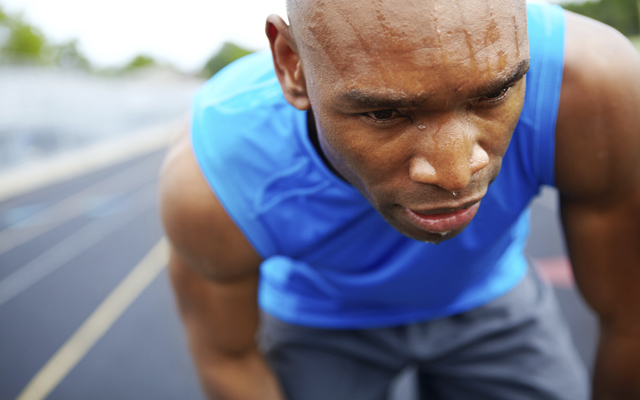Athletes must address multiple nutritional needs relative to their sport. They can depend on a number of factors—specialty or playing position, training schedule, adaptation goals, or body composition goals.
But too often poor eating habits, even too little intake of calories or protein, can cause inadequate nutrition and constant fatigue (1-3). The goal of any nutrition plan should be to keep you healthy and injury free, while maximizing functional and metabolic adaptations for increasing performance (4-5).
Let’s talk about a real world example. Jane is a 33-year-old, 135-pound runner. She wants more energy while ideally losing a few pounds of excess body fat. Here’s a breakdown of her typical daily schedule:
| Time | Food/Exercise/Mood |
| 5:00 a.m. (Before Workout) | Large mug of black coffee |
| 5:30 a.m.-6:30 a.m. | 60-minute run, does not bring water |
| Breakfast | Granola bar and an apple |
| Morning Break | More coffee |
| Late Lunch | Small chicken salad |
| Afternoon | Iced coffee with milk |
| 3:00 p.m.-5:00 p.m. | Tired, unable to focus at work |
| After Work | Starving and too tired to cook so she eats a “healthy” microwavable dinner |
| Before bed | Eats a bowl of cereal because she can’t fall asleep due to hunger |
Based on Jane’s schedule, we begin to notice a few problems. She’s not properly hydrating in the morning. She’s not getting enough protein at breakfast. She takes too long to fuel up between meals, which affects her energy levels in the afternoon when she feels tired and unable to focus at work. Overall, she’s not getting sufficient calories or total nutrients to meet recommendations.
In fact, Jane is missing a huge amount of calories and vital nutrients that her body needs just to perform. She lacks the proper amounts of carbohydrates, protein, and fats her body needs to recover. She’s also lacking in proper hydration and supplementation that would make her feel more energized and alert during her workout and the day.
A Better Way to Perform
- Determine how many calories are needed daily. It should be enough to maintain a stable body weight, good health status, and optimal physical performance. For active people, a good starting point is about 45 calories per kilogram of bodyweight (6).
- Use the right nutrient recommendations according to sport, type of training, and season. For example, hydrate more during the summer, consume carbohydrates before and during exercise, and properly space protein intake over the course of the day.
- Create a meal schedule that works with your life. In this way, you will be able to optimize training, have maximum performance, and help ensure correct post-exercise recovery.
- Evaluate and correct excess and deficiencies of nutrients as well as errors related to hydration.
Get Your Macronutrients
Consider major nutrition targets like carbohydrates, protein, and fat.
- Carbohydrates – Carbohydrate intake during exercise maintains high levels of work output for longer durations (6). An important goal for any athlete in their everyday diet is to provide the muscles with carbs to fuel the training program and restock energy between workouts (7). Recommendations for carbohydrate intake typically range from 1.5-4.5 grams per pound of bodyweight depending on the fuel demands of training or competition, energy requirements, and body composition goals (4).
- Protein – Consuming approximately 20-40 grams of protein in the hours before exercise and/or during the recovery period can lead to increased whole body and muscle protein synthesis as well as improved nitrogen balance, meaning more muscle (6). It’s also important to regularly space modest amounts of high-quality protein throughout the day and when energy is reduced as during weight loss since higher protein intakes are needed to retain muscle mass (4).
- Fat – For most athletes, fat intakes associated with eating styles that accommodate dietary goals typically range from 20-35 percent of total energy intake (7). Over-restriction of fat can negatively affect overall health and performance goals. Conversely, extremely high-fat, carbohydrate-restricted diets do not provide a benefit to the performance of competitive athletes and are not supported by current literature (7).
Create Balance and Get Your Sleep
Remember, most of your recovery after exercise happens during non-waking hours. Making sleep a priority is often one of the most powerful changes in the lifestyle for results. While it’s not technically a nutrient, sleep is essential to recharge your body with the rest needed to feel fully functional and perform well. Athletes should allow seven to nine hours of uninterrupted sleep per night for proper recovery.
For better sleep, it’s important not to starve yourself. In Jane’s example, she couldn’t sleep due to hunger at nighttime. She also restricted too much for too long. It could lead her to end up over-consuming when it’s not appropriate—like having three bowls of cereal before bed. Be balanced and sensible with intake over the course of the day.
Fixing Jane’s Routine
Don’t fall into the trap of under-fueling like Jane. The combination of inadequate food, inadequate protein, and improper nutrients will have you desperately fighting fatigue and will lead to poor performance and body composition.
By eating the right foods and supplements at the right times, Jane can make sure she’s energized for the entire day. She won’t get fatigued. With nutrient timing using AMPED™ Products, she can also prime her body for the most productive workout, best recovery, and highest level of energy.
Here’s a new schedule Jane can use:
| Time | Food/Exercise |
| 5:00 a.m. (Before Workout) | AMPED NOx, AMPED Power, and either Isagenix Coffee or e+™ |
| 5:30 a.m. | 90-minute run with 1 pouch of AMPED Fuel mid-way through, and 16 oz of water mixed with 2 servings of AMPED Hydrate sipped on throughout |
| Breakfast | IsaLean Shake along with 1 serving of oatmeal |
| Morning Break | 1 handful of almonds with a medium banana |
| Lunch | Chicken stir-fry with brown rice |
| Afternoon | IsaLean Bar and e+ (optional) |
| Dinner | Baked salmon with a field greens salad |
References
- Mendoza-Hernandez A, Avila-Martinez B, Rocha V, Sánchez-Quintero P & Nuñez-Guzman A. The analysis of essential nutriment intake deficiencies and the body composition compartments in college athletes. FASEB J. 2016; 30(1): 898-13.
- Mielgo-Ayuso J, Maroto-Sánchez B, Luzardo-Socorro R, Palacios G, Palacios Gil-Antuñano N, & González-Gross M4. Evaluation of nutritional status and energy expenditure in athletes. Nutr Hosp. 2015 Feb 26; 31 Suppl 3:227-36.
- Deldicque L & Francaux M. Recommendations for Healthy Nutrition in Female Endurance Runners: An Update. Front Nutr. 2015 May 26; 2:17.
- Thomas DT, Erdman KA & Burke LM. Position of the Academy of Nutrition and Dietetics, Dietitians of Canada, and the American College of Sports Medicine: Nutrition and Athletic Performance. J Acad Nutr Diet. 2016 Mar; 116(3):501-28.
- Maughan RJ & Shirreffs SM. Nutrition for sports performance: issues and opportunities. Proc Nutr Soc. 2012 Feb; 71(1):112-9.
- Beck KL, Thomson JS, Swift RJ & von Hurst PR. Role of nutrition in performance enhancement and postexercise recovery. J Sports Med. 2015 Aug 11; 6:259-67.
- Burke LM, Kiens B & Ivy JL. Carbohydrates and fat for training and recovery. J Sports Sci. 2004 Jan; 22(1):15-30.





